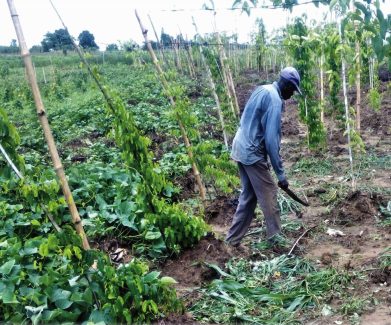- Experts recommend application of modern techniques to tackle food shortage
Nigerian farmers have disclosed how they suffered huge losses due to delays in rainfall and flooding in this year’s farming season.
They said the devastating climate change caused rain delays and when it started raining, it did so in excess in some parts of the country and resulted in floods that swept farmlands away.
The Chairman of the Federation of Agricultural Commodity Association of Nigeria, Osun State chapter, Jayeoba Kamoru Alagbada, explained that the harsh experiences impacted their farm harvest negatively.
He said plantations and crops running to millions of naira were destroyed by climate change that was witnessed in this year’s farming season, saying if such eventuality is not prevented, Nigeria’s food shortage crisis may worsen.
To prevent further losses in the future as farmers prepare for dry season farming, the Institute for Sustainable Agriculture National Resources and Research Centre (ISANRRC) has trained farmers in Osun State on the technicalities of modern ways of cultivating crops.
The institute, in partnership with All Farmers Association of Nigeria, Osun State Chapter, during the two-day free 2024 farmers training in Osogbo, organised extensive training and orientation programmes on cassava, yam, maize, and sweet potato cultivation and their value chains.
At the training, the farmers were urged to move from subsistence method of farming to mechanised one even as different trainers acquainted them with technical skills on how to effectively produce in line with the global best practices, which will also translate to realisation of optimal yield and return.
Speaking, the President of the institute, Prof. Sheu Yahaya, said the chosen crops that the farmers were trained on are major and also currently demanded in the export market, adding that they have a very long value chain that can provide a wide range of opportunities to the teaming populace.
While calling on the beneficiaries of the free training to ensure the constant study of climate change in order to know what, when, where, and how to cultivate their crops, Yahaya lamented how climate change which includes lack of rainfall and, flooding among others destroyed many plantations and wreaked havoc on people’s farms and created huge losses during harvest.
Yahaya who lectures at the Department of Agronomy, Bayero University, Kano, maintained that climate change has unleashed unpredictable weather patterns, including droughts, floods, and torrential rains, which have ravaged crops and livestock, destroying farmers’ hard work and imperiling food availability.
“This in turn has exacerbated poverty and malnutrition, affecting a significant portion of the population in the sub-region, further entrenching vulnerability and food insecurity,” he said, adding that the inability of farmers to produce foods optimally owing to their losses has triggered soaring prices of food, which has been putting the nation’s most vulnerable citizens at risk of extreme hardship.
He stated, “We are faced with the issue of climate change which makes us vulnerable in terms of food to eat and also, employment. So, our farmers need these technicalities and we expect that they will be able to provide employment in the sense that farming is beyond subsistence level, you farm to get food as well as get an income.
“Taraba and Adamawa States which contribute significantly to the good chain production in Nigeria could not provide enough food this year because of flooding.”
Lamenting the loss he suffered in his farmland, the expert said, “In Jigawa, I lost one of my rice farms to flooding which is least expected in my area. So, this climate change is real. Our farmers need to do away with the old traditional system of cultivation with respect to good agronomic practices, selection of seeds, time of planting and what have you. They should embrace technological advancement in farming.
Addressing the farmers on the need to put all they have learned into action, Prof. Oluwatuyi Omotoso, a member of Governing Council of the institute, said the knowledge acquired would prevent farmers from incurring further losses in their future farming endeavours.
Dr Abioye Olusegun, the Zonal Director of the institute in South West, said the training is for the farmers to be prepared against next year, adding that if the nation’s agricultural potentials are well utilized, farmers will cultivate food insufficiency and Nigerians would be able to get foods at affordable rates.
He also explained how a farmer lost his maize plantation to drought this year after spending millions of naira to cultivate the crop.
Alagbada, while speaking, described the orientation and sensitisation as timely, promising that everything learned would be put into practice in order for food shortage in the country to be tackled.
The FACAN called on South West Governors to invest more in agriculture in order to prevent the region from depending on food from the Northern part of the country.
While urging all Nigerians to embrace farming, he said, “People should know that everyone should be a farmer. We should have farms in our backyards, and reduce the rate at which we plant flowers and plant more crops that we can eat. In the olden days, our forefathers lived long because they ate fresh foods on a daily basis. The soups our fathers cooked today, they cannot eat tomorrow. We no longer eat fresh foods again. We transport vegetables to other states for three or five weeks, and all these things we put in the fridge are affecting our lives.”

